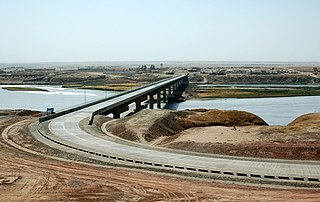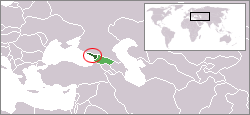The politics of Tajikistan nominally takes place in a framework of a presidential republic, whereby the President is both head of state and head of government, and of a multi-party system. Legislative power is vested in both the executive branch and the two chambers of parliament.

The Tajikistani Civil War, also known as the Tajik Civil War, began in May 1992 and ended in June 1997. Regional groups from the Garm and Gorno-Badakhshan regions of Tajikistan rose up against the newly formed government of President Rahmon Nabiyev, which was dominated by people from the Khujand and Kulob regions. The rebel groups were led by a combination of liberal democratic reformers and Islamists, who would later organize under the banner of the United Tajik Opposition. The government was supported by Russian military and border guards.
The United Nations Mission of Observers in Tajikistan (UNMOT) was a peacekeeping mission established by the United Nations Security Council in December 1994, and its mandate expired in May 2000. Its purpose was to monitor peace agreements during and after the Tajikistan Civil War. The observers were first deployed in the wake of the ceasefire, in 1994, between the ruling government of Tajikistan, led by Emomali Rahmonov, and the United Tajik Opposition. After the UN-sponsored armistice ended the war in 1997, the UN expanded the mission's original mandate to monitor the peace and demobilization. The mission was headquartered in Dushanbe, Tajikistan.

United Nations Security Council resolution 911, adopted unanimously on 21 April 1994, after reaffirming resolutions 813 (1993), 856 (1993) and 866 (1993), the Council welcomed progress made towards establishing the Liberian National Transitional Government but was concerned about subsequent delays in implementing the Cotonou Peace Agreement, and extended the mandate of the United Nations Observer Mission in Liberia (UNOMIL) until 22 October 1994.

United Nations Security Council resolution 968, adopted unanimously on 16 December 1994, after noting statements by the president of the security council and reports by the Secretary-General Boutros Boutros-Ghali on the situation in Tajikistan, the council established the United Nations Mission of Observers in Tajikistan (UNMOT) and addressed the process of national reconciliation in the country.

United Nations Security Council resolution 999, adopted unanimously on 16 June 1995, after recalling Resolution 968 (1994) on the situation in Tajikistan, the Council extended the mandate of the United Nations Mission of Observers in Tajikistan (UNMOT) until 15 December 1995 and addressed the process of national reconciliation in the country.

United Nations Security Council resolution 1030, adopted unanimously on 14 December 1995, after recalling previous resolutions 968 (1994) and 999 (1995) on the situation in Tajikistan, the Council extended the mandate of the United Nations Mission of Observers in Tajikistan (UNMOT) until 15 June 1996 and addressed the process of national reconciliation in the country.

United Nations Security Council resolution 1061, adopted unanimously on 14 June 1996, after recalling all resolutions on the situation in Tajikistan and the Tajik-Afghan border, the Council extended the mandate of the United Nations Mission of Observers in Tajikistan (UNMOT) until 15 December 1996 and addressed efforts to end the conflict in the country.

United Nations Security Council resolution 1089, adopted unanimously on 13 December 1996, after recalling all resolutions on the situation in Tajikistan and the Tajik-Afghan border, the Council extended the mandate of the United Nations Mission of Observers in Tajikistan (UNMOT) until 15 March 1997 and addressed efforts to end the conflict in the country.

United Nations Security Council resolution 1096, adopted unanimously on 30 January 1997, after reaffirming all resolutions on Georgia, particularly Resolution 1065 (1996), the Council addressed the current situation extended the mandate of the United Nations Observer Mission in Georgia (UNOMIG) until 31 July 1997.

United Nations Security Council resolution 1099, adopted unanimously on 14 March 1997, after recalling all resolutions on the situation in Tajikistan and the Tajik-Afghan border, the Council extended the mandate of the United Nations Mission of Observers in Tajikistan (UNMOT) until 15 June 1997 and addressed efforts to end the conflict in the country.

United Nations Security Council resolution 1113, adopted unanimously on 12 June 1997, after recalling all resolutions on the situation in Tajikistan and the Tajik-Afghan border, the Council extended the mandate of the United Nations Mission of Observers in Tajikistan (UNMOT) for a period of three months until 15 September 1997.

United Nations Security Council resolution 1128, adopted unanimously on 12 September 1997, after recalling all resolutions on the situation in Tajikistan and along the Tajik-Afghan border, the Council extended the mandate of the United Nations Mission of Observers in Tajikistan (UNMOT) for a period of two months until 15 November 1997.

United Nations Security Council resolution 1138, adopted unanimously on 14 November 1997, after recalling all resolutions on the situation in Tajikistan and along the Tajik-Afghan border, the Council expanded and extended the mandate of the United Nations Mission of Observers in Tajikistan (UNMOT) until 15 May 1998.

United Nations Security Council resolution 1167, adopted unanimously on 14 May 1998, after recalling all resolutions on the situation in Tajikistan and along the Tajik-Afghan border, the Council extended the mandate of the United Nations Mission of Observers in Tajikistan (UNMOT) for a further six months until 15 November 1998.

United Nations Security Council resolution 1206, adopted unanimously on 12 November 1998, after recalling all resolutions on the situation in Tajikistan and along the Tajik-Afghan border, the Council extended the mandate of the United Nations Mission of Observers in Tajikistan (UNMOT) for a further six months until 15 May 1999.
United Nations Security Council resolution 1240, adopted unanimously on 15 May 1999, after recalling all resolutions on the situation in Tajikistan and along the Tajik-Afghan border, the Council extended the mandate of the United Nations Mission of Observers in Tajikistan (UNMOT) for a further six months until 15 November 1999.

United Nations Security Council resolution 1255, adopted unanimously on 30 July 1999, after reaffirming all resolutions on Georgia, particularly Resolution 1225 (1999), the council extended the mandate of the United Nations Observer Mission in Georgia (UNOMIG) until 31 January 2000.

United Nations Security Council resolution 1287, adopted unanimously on 31 January 2000, after reaffirming all resolutions on Georgia, particularly Resolution 1255 (1999), the Council extended the mandate of the United Nations Observer Mission in Georgia (UNOMIG) until 31 July 2000.

United Nations Security Council resolution 1346, adopted unanimously on 30 March 2001, after recalling previous resolutions on the situation in Sierra Leone, the Council extended the mandate of the United Nations Mission in Sierra Leone (UNAMSIL) for a further six months and increased the size of its military component.















